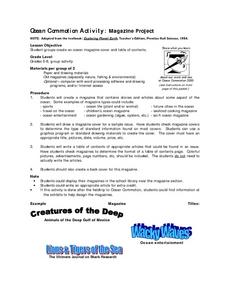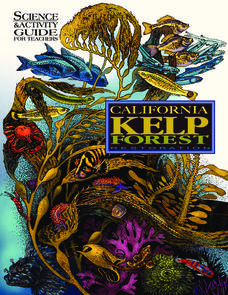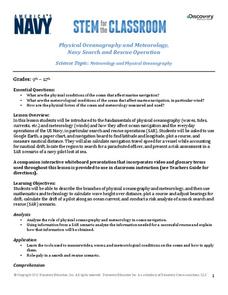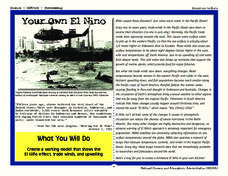Howard Hughes Medical Institute
Ocean Acidification
Human impacts on the environment can sometimes be difficult to measure, especially under water! An activity centered on ocean acidification gives science scholars the opportunity to examine the effects of carbon dioxide on marine life....
Curated OER
Magazine Project
Groups of students create magazines that contain stories and images of one aspect of the ocean, and ocean life. The expectations for the final products are quite high, so this lesson will require some effort to properly implement. A...
University of Waikato
Build a Marine Food Web
Dive into a lesson on marine ecosystem interactions. Individuals learn about and devise a marine food web. The resource provides organism cards and pupils use article resources to discover interactions before modeling them in a food web.
Ask a Biologist
It’s a Plankton Eat Plankton World
For as small as they are, plankton sure play an enormous role in maintaining marine ecosystems. Dive into an investigation of these tiny organisms with a hands-on life science activity in which children cut out pictures of sea...
NOAA
Motion from the Ocean
Create a fish mobile using cardboard and string to hang in the classroom while studying ocean life. Each printable requires pupils to cut out two of the same fish to create consistency on the front and back.
NOAA
Why is Hawaii's Ocean Important?
Studying the oceans? Focus on Hawaii's ocean with a resource packed with activity-based worksheets. Everything from products that come from the ocean to the abundance of plants and animals that call the ocean their home, Hawaii's ocean...
NOAA
Why Should I Care?: Show How Increased Carbon Dioxide Makes the Ocean More Acidic
How does a change in pH affect the ocean ecosystem? Scholars explore the idea by making an acid-base indicator in part seven of the 10-installment Discover Your Changing World series. First, they explore impacts of carbon dioxide in...
University of Waikato
Ocean Acidification and Eggshells
Eggshells and seashells have a lot in common. Learners use the similarities to conduct an experiment that models the effect of ocean acidification on marine animals. Using varying levels of acidic liquids, pupils make observations on the...
Wilderness Classroom
Ocean Life
Our oceans are composed of many complex relationships. Young oceanographers explore relationships between organisms, understand the world ocean's currents, and discover the effects of water pollution and how it behaves. There are...
Carnegie Mellon University
Ocean Acidification
After brainstorming what they know about ocean acidification, youngsters place eggs in acid to determine the effects on calcium-containing organisms, and add carbon dioxide to solutions with sea shell material to discover the impact on...
Dawn N . Ericson
California Kelp Forest Restoration
This unit is so cool, you won't be able to "kelp" yourself! Intended for all grades, this science and activity guide for teachers offers a unique opportunity to understand kelp's role as a valuable ecological resource. Teachers and...
Rainforest Alliance
Protecting the Critical Habitat of the Manatee and Loggerhead Turtle
Explore ocean habitats with a lesson that showcases the home of manatees and loggerhead turtles in Belize. Here, pupils compare and contrast the homes of ocean animals to those of humans, listen to an original short story about...
Discovery Education
Physical Oceanography and Meteorology, Navy Search and Rescue Operation
It's an ocean rescue mission! Groups must find a pilot downed off the coast of the Chesapeake Bay. Rescuers must determine the distance needed to travel as well as the heading to get to the pilot's last known position. Taking...
NOAA
Endangered Species Origami
Make sea turtle or whale origami in a hands-on activity that provides instructions for folding and facts for learning about each.
American Museum of Natural History
Rubber Blubber Gloves
Using gloves, shortening, tape, and a lot of ice, participants experience the feeling of having blubber. The experiment's eight steps follow an informative page about blubber and animals that have it.
American Museum of Natural History
Make Your Own Creatures of Light
Bioluminescent animals are the focus of a hands-on craft in which scholars create a scene of either a land or sea bioluminescent creature.
NOAA
Your Own El Nino
Scholars make a model to discover how the force of trade winds over the Pacific Ocean creates an El Niño. Super scientists observe how the severe weather affects life in water and on land.
University of Georgia
Land Biomes Project
Challenge scholars to research a biome and create a presentation for the producers of Survivor to choose their ecosystem for the next season's show. The materials include outlines, worksheets, and grading rubrics for individuals as well...
International Technology Education Association
Pixel This!
Did the image I drew match the image you saw? By simulating a satellite and a ground station, teams of two transmit data in the form of pixels in order to recreate an image. They use four different levels of brightness, creating slightly...
American Museum of Natural History
Crazy Camouflage
Scholars discover the crazy camouflage technique of the flounder fish. After reading three informative paragraphs, participants follow steps to make a model of the sea creature.
Curated OER
Summer Intern
Your young apprentices build a function describing the percent concentration of salt in a brine. The rational function is then related to the parent function, y= 1/x, and graphed. Finally, the apprentices predict the amount of fresh...
Science Buddies
Science Buddies: Swimming in Acid: Understanding Ocean Acidification
The oceans are a precious natural resource, part of Earth's carbon cycle. But what happens if the oceans absorb too much carbon dioxide? Many scientists are concerned that the increased absorption of carbon dioxide is causing them to...
Read Works
Read Works: Marine Biology
[Free Registration/Login Required] A literary text about a boy named Frank who grew up loving the ocean and has dreams of becoming a marine biologist. A question sheet is available to help students build skills in reading comprehension.
National Geographic
National Geographic: Ocean Abiotic Factors
After looking at examples of biotic and abiotic factors in ecosystems, students focus on abiotic factors in marine ecosystems, the physical processes that are involved, and the impact human activities can have on these. Includes handouts...























